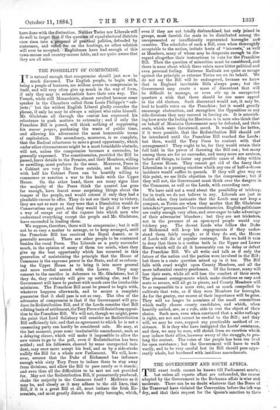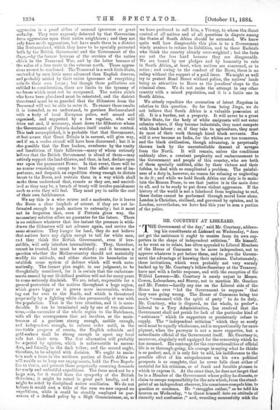THE GOVERNMENT AND SOUTH AFRICA.
THE exact truth cannot be known till Parliament meets ; but unless all reports afloat are unfounded, the course adopted by the Government in the Bechuana affair is wise and moderate. There can be no doubt whatever that the Boers of the Transvaal have violated the Convention before the ink was dry, and that their request for the Queen's 'sanction to their aggression is a proof either of unusual ignorance or great asdacity. They were expressly debarred by that Convention from aggressions upon their native neighbours ; and they not only have made aggressions, but have made them in a district like Bechuanaland, which they knew to be specially protected both by the British Government and the Government of the Oape,—by the former because of the services of the native chiefs in the Transvaal War, and by the latter because of the value of a free route to the extreme north. Those aggres- sions cannot be condoned. The Transvaal is a weak little State, controlled by men little more advanced than English drovers, and probably misled by their entire ignorance of everything outsIde their own farms ; but though these palliatives are entitled to consideration, there are limits to the tyranny of weakness which must not be overpassed. The native chiefs Who have been plundered must be reinstated, and the district threatened must be so guarded that the filibusters from the Transvaal will not be able to enter it. To ensure these results it is intended, as we understand, to garrison Bechuanaland with a body of local European police, well armed and organised, and supported by a few regulars, who will drives out and, if necessary, shoot down the filibusters whom the 'Government of Pretoria declares itself unable to control. This task accomplished, it is probable that that Goveenment, at last aware that Great Britain is in earnest, will give way, and if so, a modes tivendi will have been discovered ; but it is also possible that the Boer leaders, overborne by the vanity and fanaticism of their followers—many of whom seriously believe that the British Government is afraid of them—may actively support the land-thieves, and thus, in fact, declare open war upon the paramount Power. In that event, there will be no course remaining except to treat the affair as one of im- portance, and despatch an expedition strong enough to dictate terms to the Boers, and restrain them in a way which shall make them understand that, remote as they are, and uncivil- ised as they may be, a breach of treaty will involve punishment such as even they will feel. They must pay in cattle the cost of their own faithlessness.
We say this is a wise course and a moderate, for it leaves the Boers a clear loophole of retreat, if they are not in- fatuated enough to push matters to extremity ; but it must not be forgotten that, even if Pretoria gives way, the momentary solution offers no guarantee for the future. There is no evidence whatever that the instant the pressure is with- drawn the filibusters will not advance again, and revive the same situation. They hunger for land,. they do not believe that natives have any rights except to toil for white men, and they think the British Government, even if irre- sistible, will only interfere intermittently. They, therefore, cannot be trusted, but must be watched ; and it becomes a question whether the Mother-country should not materially modify its attitude, and either shorten its boundaries or establish some system of defence which will work auto- matically. The former plan ought, in our judgment, to be thoughtfully considered, for it is certain that the embarrass- ments caused by our ill-defined position will not for many years to come seriously diminish. We are, infect, responsible for a general protection of the natives throughout a huge region, which grows bigger as it grows more inaccessible, widen- ing out for ever to the North, and which is threatened perpetually by a fighting white clan permanently at war with the population. That is the true situation, and it is unen- durable. It can be terminated only by one of two alterna- tiees,—the surrender of the whole region to the Dutchmen, with all the consequences that act involves, or the main- tenance of a garrison strong enough, mobile enough, and independent enough, to enforce order until, in the inevitable progress of events, the English colonists and gold-seekers shall be strong enough to upset any local rule but their own. The first alternative will probably be rejected by opinion, which is unfavourable to surren- dere, and friendly to the dark tribes ; and the second ought, therefore, to be adopted with decision. We ought to main- ta'n Buell a force in the northern portion of South Africa as will enable us to keep our engagements, hold the Free Repub- lics to theirs, and prevent these perpetually recurring demands for costly and unfruitful expeditions. The force need not be a large .one, for it would have the sympathy of the British Optometry; it might be raised in great part locally, and it might be aided by disciplined native auxiliaries. We do not believe it would coat a tithe of the sum we.now expend on expeditions, while it could be steadily employed in pur- suance. of a defined policy by a High Commissioner, or, as we have preferred to call him, a Viceroy, to whom the direct control of all natives and of all -questions in dispute among the States of South Africa should be entrusted. We know quite well how disagreeable this plan is to a Government wisely anxious to reduce its liabilities, and to those Radicals who think the country already over-weighted ; but the facts are not the less hard because they are disagreeable. We are bound by our pledges and by humanity to rule in South Africa,_ at least, when natives are concerned, or to retire ; and owing to the conduct of the Boers, there is no ruling without the support of a paid force. We might as well try to protect Bond Street without police, the natives' lands being as attractive to Boers as the jewellers' shops to the criminal class. We do not make the attempt in any other country with a mixed population, and it is a futile one in South Africa.
We utterly repudiate the accusation of latent Jingoism in relation to this question. So far from being Jingo, we do not believe that South Africa is a valuable possession at all. It is a burden, not a property. It will never be a great White State, for the body of white emigrants will not enter colonies where, if they become industrials, they must compete with black labour ; or, if they take to agriculture, they must do most of their work through hired black servants. Nor will it ever become an India, for the whites are too numerous, and the black civilisation, though advancing, is perpetually thrown back by the uncontrollable descent of savages from the North. It will remain, unless the conditions suddenly alter, a constant perplexity and embarrassment to the Government and people of this country, who are both of them specially unfitted, alike by their virtues and their foibles, to deal with so complicated a problem. The painful- ness of a duty is, however, no reason for refusing or neglecting to do it ; and while we hold South Africa our duty is to main- tain the Roman Peace, to see that justice is in the main done to all, and to be ready to put down violent aggressors. If the history of the world is not a falsehood from beginning to end, those duties cannot be performed through moral force alone. London is Christian, civilised, and governed by opinion, and in London, nevertheless, we have had this year to arm a portion of the police.



































 Previous page
Previous page